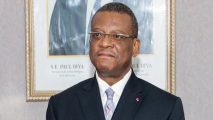11, November 2017
Southern Cameroons Crisis: Another gendarme dies in Mamfe 0
A young French Cameroun gendamerie officer recently deployed to Mamfe in the Federal Republic of Ambazonia to counter the Southern Cameroons revolution was found death on November the 9th 2017 in the Manyu River.
Constable Glorian Cédric described by Francophone security sources as a student gendarme was detached to strengthen a special unit set up since October 1, 2017 in Mamfe and Ekok. His demise comes amid the unfortunate incidents of Jakiri and Bamenda where three gendarmes were cowardly killed.
Constable Glorian Cédric was reportedly in a training at Camp Yeyap in Yaoundé and was hurrily sent to Mamfe where he drowned in the main river not far from the gendarme head office in Mamfe-Egbekaw. Cameroun Info.Net reported that after a morning sport session with his pals, the gendarmes went to the river to swim and while they were bathing, Cédric was washed away.
By Chi Prudence Asong with files from Cameroon Info.Net


























17, November 2017
National Assembly Fire Disaster: Cavaye Djibril watched helplessly 0
The National Assembly building at Ngoa-Ekelle has suffered its third fire since its construction. But that which occurred yesterday, November 16, 2017 remains the most serious.
Cameroon Concord News gathered that it took about three hours to completely extinguish the fire that broke out around 9 pm yesterday.
The fury of the flames consumed the third and fourth floors before firefighters could control the spread of the flames. The fire was reportedly turned off shortly after midnight.
Some French Cameroun MPs, including the Honorable Cavaye Yegui Djibril, rushed to the scene and watched helplessly.
After 1995 and 2013, it is the third time since its construction that the glass house at Ngoa Ekelle is attacked by fire. The Francophone dominated security agencies have opened an investigation.
By Sama Ernest in Yaounde